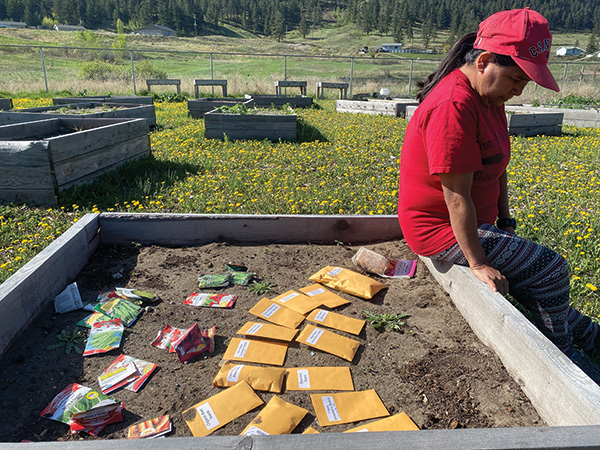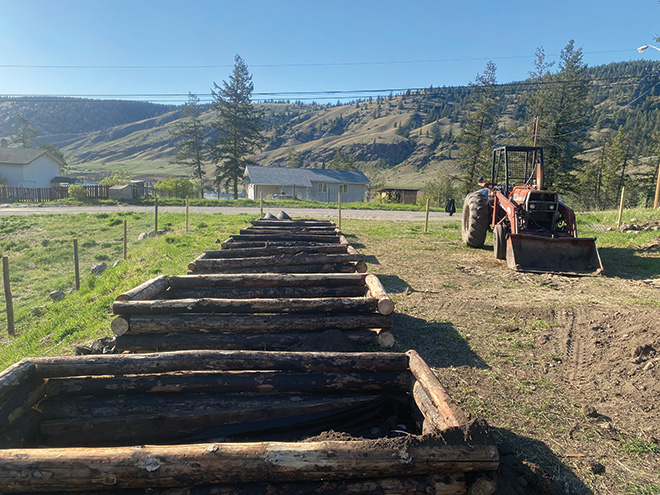By Jonathan Hand —
Springtime this year arrived unlike most, flooding our lives with uncertainty as we rallied to mitigate the risks of a global pandemic. While overcoming the many hardships created by COVID-19, we have also begun to see the seeds sowed for the better. Just as winter fades to the promise of spring, adversity is often the starting point for growth and newness. We can understand this same lesson from watching fire sweep the land and create balance in the ecosystem, or fasting in the sweat lodge to pray for clarity and guidance—suffering can bring about a lasting imprint as we learn to move forward.

One of the positive changes we are experiencing in Esk’etemc amidst the pandemic is a reconnection with our food. We were aware that we relied on outside sources of food as a community, but that fact is easy to take for granted when the grocery stores are fully stocked most of the time. With the food supply chain put into question by COVID-19, there is now a bottom-up movement in Esk’et towards reinvigorating our food culture and revisiting our history of food production.
Esk’etemc have a rich history of self-sufficiency and a deep understanding of how to look after the land to receive a bounty from it. People here had the knowledge and skills to manage soil and livestock, grow food, and build and maintain root cellars, and a myriad of other abilities that allowed them to provide for themselves and their families. Many community members alive today remember the short summer months they spent at home while not in residential school, helping their families and elders prepare gardens and root cellars. Although residential school greatly impacted the passage of cultural and traditional knowledge for Esk’etemc and other First Nations, the knowledge to grow and store food has silently persisted. With pressure from the pandemic, that capacity for self-sufficiency has started to awaken once again.

In the early stages of the pandemic, I had a conversation with my good friend Robert Johnson about a vision for the community, where people were working the land again and inspiring others to do the same. Since then, the community has achieved more than I imagined. Many households in the community have taken it upon themselves to build garden boxes, the Sxoxomic School worked with students at home to plant seeds, and fields are being plowed and used for the first time in years. The local community garden box area nearly doubled its number of garden boxes this year and will be growing food to sell through the local store at an affordable cost. Moreover, the Esk’etemc Band is supporting community members with garden box kits at an affordable price, with over 60 households signed up. Robert and I became part of the movement ourselves, building a garden area in a shared space with Robert’s neighbour, bringing all of our families together in a collective effort. We used salvaged logs from the nearby Mayfield area that burned in 2019, local soil, and local manure, and we cleared the land with fire in the spring, making the process extremely rewarding on a personal and holistic level.
All of these efforts are part of a bigger vision that Esk’etemc has to become food resilient and self-governing. The unexpected hardship of COVID-19 propelled us forward and has given us a starting point to revisit our large-scale agriculture goals and how we can make agriculture programs thrive on our land base. Esk’etemc believe in using the land to protect and steward it for all walks of life, thus food production represents an immense opportunity to begin managing the land more sustainably while also creating meaningful employment opportunities in the food sector for our people.

While we are starting small with a household resurgence of gardening, I believe we are making a major step forward towards our overarching goals of being self-sufficient as a community. We are also seeing how food can bring our families and community members together to share knowledge and skills, and simply enjoy time together. Even if large-scale plans are years away from being a reality, I feel in my heart that something deeply important is happening in Esk’etemc and that this time of adversity and uncertainty will be a pivotal moment in our story.
Jonathan Hand is a Newfoundlander who has been living and working in Esk’et since 2018. He has a degree in marine biology and sustainability from Dalhousie University, as well as a master’s degree in development practice from the University of Waterloo. He works in communications for Esk’etemc and is honoured to live, learn, and serve in the community.

